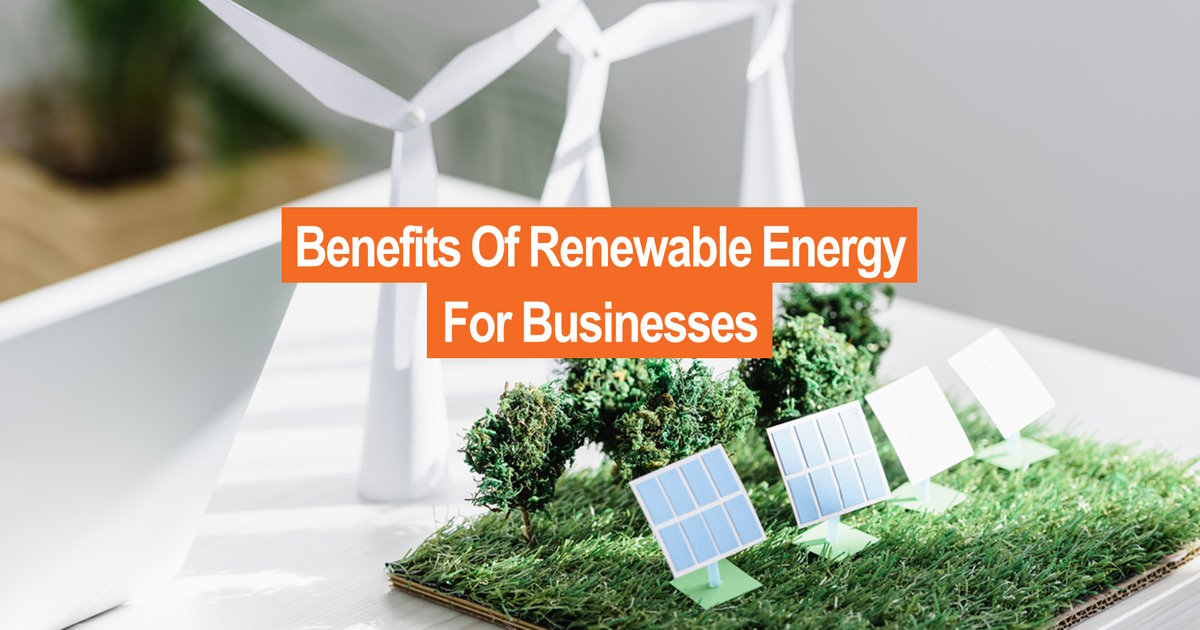Renewable energy sources are undoubtedly good for our planet. As we use up remaining fossil fuels, everyone must look for more sustainable ways to produce electricity.
As governments and large corporations invest in solar panels and wind farms, many smaller businesses are starting to wonder if they could benefit from making the switch sooner rather than later.
But there remains a general need for more understanding around renewable energy systems, how they can be used, and if they are developed enough to help power entire businesses.
So, is renewable energy cheaper for businesses? What are the benefits of using green energy for businesses? Should you consider investing?
Read on to find out more.
Renewable Energy – Business Advantages
Renewables have been a topic of conversation for over a decade. With most people now very aware of their carbon footprint and environmental impact, more businesses are coming under pressure to switch over to renewable energy sources.
But is it a good idea for most businesses?
While caring for the environment is undeniably important, it cannot come at the company’s cost. If renewable energy were a bad financial investment, it would prevent many companies from switching to cleaner energy sources. But is renewable energy a good investment?
Many think renewable energy sources such as wind, solar, and hydroelectric are expensive. In addition, many people are concerned about how much energy can be produced from smaller systems.
While the initial investment costs can be prohibitive, there are numerous benefits for businesses that opt for renewable energy sources to power their operations.
We take a closer look at just some of the many benefits of renewable energy for businesses.
1. Consistently Lower Energy Bills
Perhaps the most common reason businesses consider when deciding to switch to renewable energy sources is to help lower energy bills. Traditional energy sources, including gas, oil and coal, are limited, so energy prices for industrial and business industries are slowly rising, year on year.
From a financial perspective, moving to renewable sources will result in lower energy bills over time.
Furthermore, as oil and gas prices depend on international politics (the war in Ukraine, relations in the Middle East, etc.), energy bills often fluctuate considerably, which can cause cash flow problems and be hard to predict.
Renewable energy is more consistent and can usually be stored for future months, meaning you don’t have to worry about a sharp increase from one month to the next.
But is renewable energy more cost-effective in the long run?
Yes, many renewable energy systems, particularly solar panels, have significantly lower maintenance costs. Unlike traditional generators and energy systems, once installed, they can be left to produce energy without needing checks or expensive parts replacements. The result is that the ongoing costs are also much lower.
2. Improved Reputation
Recent studies have shown that consumers now favour businesses that can actively demonstrate eco-friendly policies. Being seen as a “green” company can help improve your business’s reputation with potential clients, winning you more business.
Switching over to renewable energy resources will likely positively impact your company’s reputation as the environment continues to dominate conversations.
Furthermore, the public considers switching to renewable energy a more reliable long-term solution. It can give the impression that you care about the environment and are willing to make intelligent business decisions for the future of your business, thereby improving your reputation and reliability.
3. Minimal Disruption And Improved Reliability
Power outages cost businesses millions every year. Statistics show that UK businesses have dealt with approximately 4.9 million planned and 96 million unplanned power interruptions in recent years, costing each business around £8,500.
With energy bills rising and talks of selected power cuts already being discussed by governments and power suppliers, relying on your own renewable energy sources will minimise disruption.
Reduced downtime can help your business run more smoothly, keeping you and your clients happy. Since most companies need access to IT and electricity for daily operations, any issues with power supply can quickly become costly.
4. Future-Proof For Green Energy Incentives
As governments worldwide come under more pressure to prevent climate change, they are increasingly offering support in the form of low-interest loans, tax breaks and cuts, and payouts to encourage businesses to opt for cleaner energy sources.
Around £5 billion of funding is currently available to help UK businesses become greener.
You may be eligible for green energy incentives depending on your industry and business operations. These can help pay for the initial investment and may also mean you pay a lower amount of tax. It’s worth checking official sources to see if you and your business are eligible.
As well as finding ways to promote renewable energy, governments in the future may also impose higher taxes or fines on companies producing high carbon emissions. By switching to renewable energy sources, you can prevent problems and safeguard your business against future policies.
The UK government aims to reach net zero carbon emissions by 2050. This means that businesses that invest now before it becomes a requirement can not only receive support but will avoid a potential increase in prices for renewable energy systems as demand increases in the run-up to this deadline.
5. Potential New Income Source
Aside from helping reduce energy bills and maintenance costs, thereby saving money in the long term, installing renewable energy sources can be another income stream.
Often, eco-energy generation systems produce more energy than a business uses. Instead of letting this go to waste, it can be sold back to the national electricity grid or nearby businesses.
Selling electricity generated by your renewable energy source can help diversify your business and is a guaranteed source of income you can rely on as long as you continue producing energy.
Are you thinking of investing in renewable energy sources for your business?
While investing in renewable energy sources for business has plenty of benefits, it isn’t always possible for companies to make the switch.
Firstly, the initial investment cost can be a barrier for smaller businesses. Purchasing and installing solar panels, wind turbines, and the appropriate energy storage systems can prevent businesses from making the switch.
The good news is that government schemes are now in place to help provide renewable energy sources for businesses at a reasonable price. Unfortunately, these do not cover every sector.
Businesses not qualifying for government support will have to raise the money themselves.
Traditional lending institutions such as banks may be unwilling to provide loans meaning specialist renewable energy finance lenders are the most appropriate alternative.
Lenders that understand the lifecycle of renewable energy systems can provide longer-term, lower-interest loans, allowing businesses to earn the return on investment that renewable energy systems require.
With so many benefits to choosing renewable energy, finances should not be holding you back. If you are interested in investing in renewable energy sources and want to learn more about the associated costs and loan agreements, get in touch today.
You could start saving money and save the planet with one small investment.




